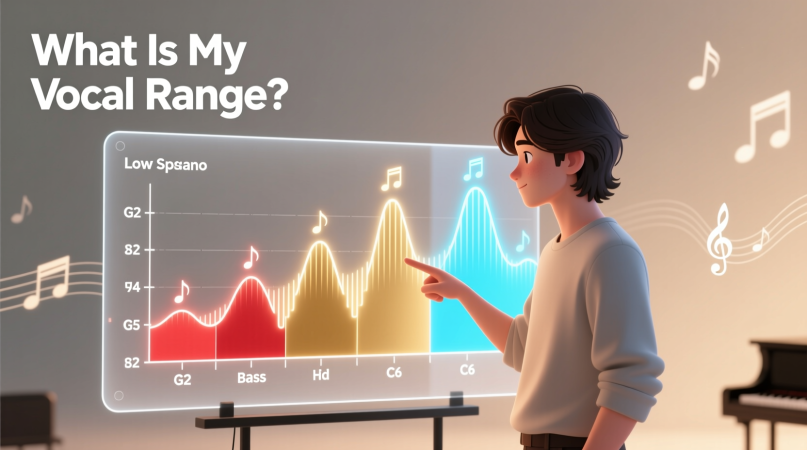
Your vocal range is the span between the lowest and highest notes you can sing clearly and comfortably. Most singers fall between 1.5 and 2 octaves, while trained vocalists often stretch beyond 3 octaves.
Why Knowing Your Vocal Range Matters
Understanding your range helps you:
- Pick songs that suit your voice instead of straining for notes.
- Identify your vocal category (soprano, alto, tenor, baritone, or bass).
- Avoid vocal strain or damage.
- Track progress as you expand your range with practice.
How to Find Your Vocal Range
1. Warm Up First
Spend 5–10 minutes on light exercises: humming, lip trills, or easy scales. Warm-ups keep your vocal cords flexible and prevent strain.
2. Find Your Lowest Note
- Use a piano, keyboard, or pitch detection app.
- Start in your mid-range and move down one step at a time.
- Stop when your voice becomes airy or loses tone.
- The last clear note = your lowest pitch.
3. Find Your Highest Note
- Begin again in mid-range.
- Move up slowly by half-steps.
- Stop when the sound cracks or feels forced.
- The last comfortable note = your highest pitch.
4. Write It Down
Example: A2 – C5 → about 2 octaves and a minor third.
Typical Vocal Ranges by Category
| Voice Type | Approximate Range |
|---|---|
| Soprano | C4 – C6 |
| Mezzo-Soprano | A3 – A5 |
| Alto (Contralto) | F3 – E5 |
| Tenor | B2 – A4 |
| Baritone | G2 – G4 |
| Bass | E2 – E4 |
👉 If your range overlaps categories, that’s normal. Many singers sit between two types.
Tools That Make It Easier
- Piano/keyboard – most precise if you know the notes.
- Pitch detection apps – instantly show your highest and lowest notes.
- Online vocal range tests – quick and beginner-friendly.
Range vs Tessitura: The Key Difference
- Range = all the notes you can sing.
- Tessitura = where your voice feels comfortable and sounds best.
You might reach high notes occasionally, but your tessitura tells you where your voice naturally shines in songs.
FAQs
Do falsetto or whistle notes count?
Yes, but note them separately from your main singing range.
Can vocal range change?
Yes—training, health, and age can all expand or limit range.
How often should I test my range?
Every few months. It’s a great way to track improvement.
Is a 2-octave range good?
Yes. That’s average and more than enough for most music.
Do I need a teacher to measure my range?
No, but a coach ensures accuracy and can help expand it safely.
